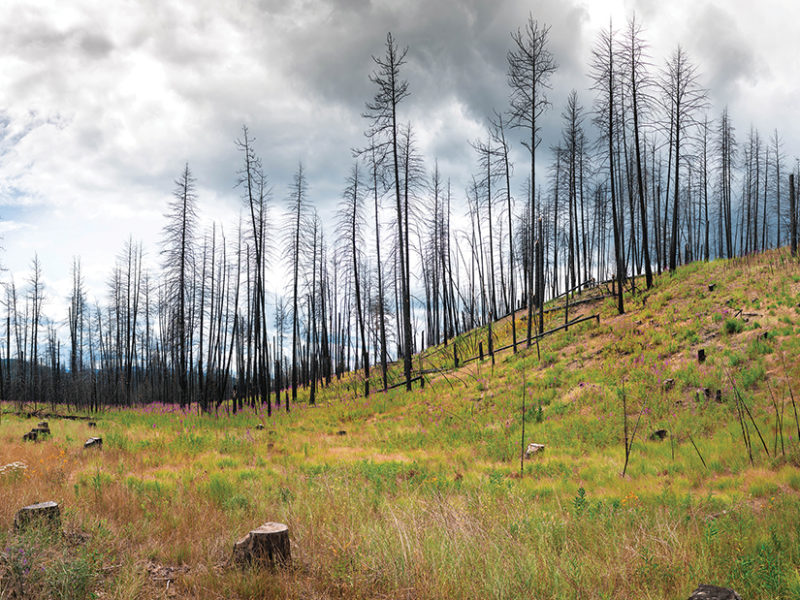WESTWOLD – Ranchers in areas hit hard by last year’s heat dome, wildfires and drought shouldn’t count on rushing out on their rangeland this summer, cautions a professional agrologist.
Chris Wellman, a fence contractor and former range agrologist with the Vernon Forest District, says many herds may need to stick close to home this season pending an assessment of range conditions. “The problem with this whole thing about grazing now is that all the Ministry [of Forests] infrastructure has been taken out – all the pasture boundaries, the fencing, the water developments – [they] have been compromised because of the fires,” he says. “As far as getting cattle into these areas, it’s virtually impossible. You could do electric fencing, but the terrain doesn’t lend itself to that.”
Fires can benefit soils by returning nutrients and reducing future fire loads. However, they also leave soils susceptible to erosion.
“The soil has no structure at this time. It needs snow-press, it needs a year or two to establish and really get structure back in the soil,” says Wellman.
Pasture conditions depend on the severity of the wildfires in each area. The province may require that some ranchers take acreage out of their grazing rotations to allow the land to recover.
“I would think that you would be very lucky in these heavily impacted areas if there’s any grazing at all,” says Wellman.
Westwold rancher Russell Clemitson considers himself lucky to have grazing options. Even though 85% of his range was touched by wildfire last year, he will be allowed to turn out cattle, albeit a bit later than normal.
“They did a fire intensity analysis on it, and they said around 30% was blacked out. So, severely burnt and the soil is burnt and everything,” says Clemitson. “And then around 40% was moderately burnt and the rest of it was lightly burnt.”
As it stands, he has just enough feed for his 350 cows until the beginning of June, which is when he would typically put his herd on grass.
“Between the drought and flooding last fall, there is no feed available in BC to purchase. And if it is, it’s so overpriced that you can’t afford to buy it now,” he says.
Fortunately, after meetings with the BC Ministry of Forests and local First Nations, his cattle will be able to return to Crown lands further into June.
“Usually, they don’t let you go back for anywhere between one to four years. They don’t like to see cattle back on these ranges [after fires],” says Clemitson. “I tried to explain to them that without summer range, five generations of ranching come to an end. … We don’t have any options.”
On one of his ranges, cattle can return at full stock with stringent management practices and he will delay turnout by up to two weeks.
“My other range also has a deferred turnout day to the middle of June rather than the beginning of the month, providing the grass is ready,” he says. To promote rangeland recovery, Clemitson will reduce his stocking rate to 60% of normal. “So, I still need to find a home for some cattle but I’m going to take 60% over 0%,” he says.
Ministry help
The impacts of reduced grazing options aren’t lost on ministry staff. Wellman says they have been doing everything they can to accommodate ranchers through the winter and know a difficult season lies ahead.
“[They’re] trying to find them programs, help them with hay or find other pastures that are vacant or other Crown tenures that are vacant. They are scrambling. It’s chaos,” he says. “It’s a really horrible situation that we’re put in. The Ministry of Forests is absolutely sweating every night trying to figure out how they’re going to help these guys. Those people are run ragged right now.”
In Clemitson’s case, the ministry is using electric fence units to keep cattle away from the blacked-out areas and off highways.
“We solely rely on the Crown ranges to keep our operations alive. I’m thankful that they’re letting us go back out there right afterwards. We are very thankful for the understanding and cooperation,” says Clemitson.
Wellman fears for large ranches that are short on feed and depend on grazing leases to feed their herds. If they can’t access their leases, that will effectively shut them off from natural feed and force them to buy forage. Some may choose to sell.
“Being put in this type of position – I wouldn’t want to be in their place,” says Wellman, who grew up on a ranch and knows the business first-hand. “It’s crazy. Some of these guys run substantial numbers. How are they going to feed these animals during the summer? Hopefully it rains all summer long or we’re going to be in trouble.”
At Lazy L Ranch in Merritt, the Lytton fire jumped the highway and affected the backside of one of the operation’s range units. The fire damage was minimal, but ranch co-owner Haley Rutherford is more concerned about drought for the upcoming season.
“We’ve already had to open up a couple little ponds that were dammed up to get some water flowing down the ditches to water stock,” she says. “Usually, we take some seasonal custom grazing cattle and we’re probably not going to do that this year.”
Rutherford and her family run 400 cows on over 3,000 deeded acres.
“The regular lack of water and drought is going to hurt us more than the fires did,” she says. And Rutherford is not convinced the province will accommodate upcoming water needs for livestock producers. For her to create off-site year-round watering, the government will require that she reallocate irrigation water to livestock watering and acquire alternate-use registration on their water licence.
“I don’t think they’re going to give anyone more water than what they’ve already got. There is no drought-proofing from that perspective,” says Rutherford.


 BC agriculture shrinks
BC agriculture shrinks